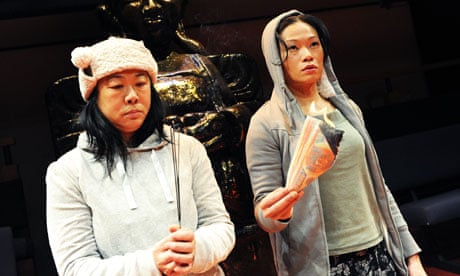Anna Chen – Wednesday, 17 November 2010

Hungry Ghosts
Written and directed by Tim Luscombe
10 Nov – 11 Dec 2010
Orange Tree Theatre, Richmond
Director/playwright Tim Luscombe sets out his agenda in the programme for Hungry Ghosts, his new play about human rights in China.
“We should remember that China’s current leadership is in power only because in 1989 it repressed a fragile but potent democratic movement,” he writes. This is more wishful thinking than evidence-based analysis. Whatever you may think of the Chinese government, not even the hardest-hearted of cold warriors considers the 1989 Tiananmen Square protest a serious threat to the continuing power of the ruling Communist party.
It seems to have been lost on the producers that the protest was actually several-fold, with supporters of the collapse of the state and its replacement by Western-style democracy forming only one strand: the one picked up by the western media. The struggle of the peasants and workers who had done so well under Mao’s pre-reform welfare system — hundreds of thousands raised out of poverty and life-expectancy almost doubled — and who were protesting against the return of the capitalist practices wrecking their healthcare, iron-rice-bowl jobs and housing, is overlooked in favour of the western narrative, which has the Chinese looking to us as the model for their political system.
The lasting model we provided for China’s emergence as a world power was the vision of Milton Friedman. The father of the Chicago School of neo-liberal pillage had, only a few months previously, been guest of honour of the Deng Xiaoping-led coterie at the head of the Communist Party, encouraging them to “modernise” and introduce the predations of the free market, thereby liberalising the economy and busting open state-owned assets for privatisation.
Luscombe’s overwhelming cold-war impulse to knock China — rather than offer any illuminating critique of the elite who are shafting the masses — permeates the play. He occasionally gets facts wrong, such as one character’s claim that “Mao told us to attack teachers”. In fact, Mao’s problem was that, once the Cultural Revolution was set in motion, he lost control of it. The Red Guards who beat teachers, leaving them maimed or dead, were not acting on instructions from the Centre. The Red Guards were not a single homogeneous mass with a single goal in a robot brain. Such was the chaos that different factions of Red Guards sprang up and fought each other, traumatising the fledgling state and wasting a decade and a generation.
We’ve come a long way since Fanshen, William Hinton’s examination of what was happening in one village at the time of the revolution. The relentless hostility of Luscombe’s outsider’s-eye-view detracts from what is a sadly rare opportunity for Chinese actors to showcase themselves.
Three meaty roles differentiate character types who are not fully alive. The hungry ghosts of the title are driven political activist and tragic heroine Ping-de (Lucy Sheen); successful but dissipated sports journalist and communist Zhi-hui (Benedict Wong) now embracing capitalism with Chinese characteristics, a “communist Murray Walker” read by a quarter of the planet; and Liv (Lourdes Faberes), the sharp fortune cookie who thrives by selling her PR services to the corrupt world of Formula One racing.
Ping-de crashes into her estranged brother Zhi-hui’s comfortable world, appealing for him to use his considerable clout with the party to save their activist sister Feng, who has been sentenced to death for treason due to her collection of evidence against corrupt officials.
Ping-de arrives in Zhi-hui’s smart Shanghai apartment bearing the MacGuffin, an 8Gb memory stick containing facts so explosive in their revelation of local corruption and the brutal enforcement of the one-child policy that it could save Feng’s life if it reaches the international media. A touching faith in the power of the Guardian in the information age, you might think.
East collides with West when Ping-de tries to enlist racing star Tyler (Andres Williams), who Zhi-hui is eager to interview, in her bid to get the memory stick out of China and save her sister. Tyler is being stuffed by his sponsors and owner, big bad Baz (Barry Stanton), who are ready to ditch him for a home-grown Chinese driver. Mixed-race Liv, played with subtle comic timing by Lourdes Faberes, combines the worst of both worlds, doing Baz’s dirty work, from smuggling out antique buddhas to betraying her lover Tyler.
Luscombe’s strength lies in his dialogue (when it’s not languishing in sub-Lao Tzu homilies), with some gorgeously arch banter and witty turns of phrase as the characters pursue their objectives.
In a lovely cat-and-mouse power play between Zhi-hui and Tyler, Benedict Wong excels, exuding world-weary gravitas with the most gravelly of voices. “Here is very liberal. Free to advertise cigarettes.” His shift into Mancunian to denote speech in native Chinese is perfect, never slipping for an instant and making it clear why some regard him as our foremost British Chinese actor.
The impressive Lucy Sheen who, like Wong has a couple of decades’-worth of experience behind her and the stage presence to go with it, takes on a whopper of a role as Ping-de. She keeps her controlled rage simmering nicely but is given little space to develop except to ratchet up the anger. The two of them express the ideas of the play but it is still the white guy who, as the protagonist, is the heart of the story.
Structurally this is linear and heavy on the longueurs. At two hours 25 minutes it could do with losing 20 minutes or so. Difficult I know when you are both writer and director but the scene towards the end, when brother fesses up to his sister, lasting 12 minutes or more, flows like wet cement and is truly a bum-acher.
In the end the Chinese characters are cyphers, mouthing political positions and keeping me out of the crudely drawn emotions despite some witty dialogue. Zhi-hui’s reversal is vastly undermotivated and it is a credit to Wong that he disguises this jarring lurch of his character arc so artfully.
Being a performance in the round, designer Tim Meacock keeps the set simple with a red-laquer-washed floor, Chinese desk and sofas, all overlooked by a giant hollow-bellied buddha. A couple of ironies which, given the context, I doubt were intentional, two examples of what is rotten in the west: Liv’s racing jacket emblazoned with the orange logo of the tax-evading Vodafone, and Tyler’s Guantanamo orange racing suit, serving as a subliminal reminder of the West’s own outrages. (Did Tim Luscombe deliberately use the name of the beautiful offspring of the Aerosmith lead singer and what’s the erstwhile Arwen done to deserve this?)
I was left with the feeling that, if Chinese life is cheap in China, as the play asserts, then it’s not much more valuable here in Britain. The programme claims that a combined number of 60,000 Chinese and Japanese died in the 1930s, completely ignoring the rape of Nanking and the estimated 1.5 million who died in the Second World War.
The Chinese are still being portrayed as either malevolent dragon ladies and lads or lotus blossoms in need of our protection. Do the producers really care about the plight of the Chinese? Or just one: the projection of the West into the character of one ghostly off-stage presence, the activist sister?

Aargh! Arwen. Thanks, Nathaniel. I'll correct that.
I feel that I have to add a commnet Benedict Wong is fantastic, but so is Andres, Lourdes and Barry it is very much a team effort which one moght not glean from a review
Which of the Chinese characters here is portrayed as a "malevolent dragon lady or lad or lotus blossom in need of our protection"? I think you are just seeing the stereotyping because you expect to see it.
The play seems very liberal, but it sounds like Benedict Wong made the play have any redeeming value. The set design does sound pretty lazy with that Buddha. Almost as if a play set in modern London had a random parish steeple as the overlooking backdrop for no apparent reason.
Anyway, I mainly wrote the above so the following correction would not appear so nakedly nerdy: Liv Tyler played Arwen, not Galadriel.